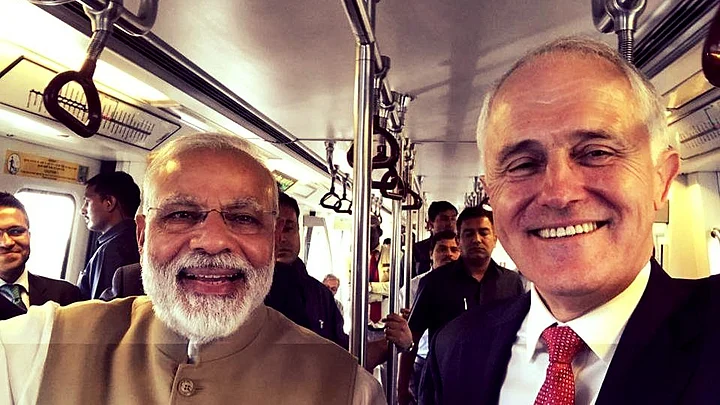Just like Australia has had a blindness for India, so too has India had a blindness for AustraliaHarinder Sidhu, Australian High Commissioner to India
The line drew chuckles and a smattering of applause from a modest audience at a roundtable discussion organised by Member of Parliament Gaurav Gogoi with the Australian High Commissioner to India, Harinder Sidhu. Students, businesspeople and foreign policy experts were in attendance for a talk on India-Australia relations.
“Politicians have been afraid of touching international relations. What if they say something off-script or not in line with the MEA (Ministry of External Affairs)?” joked Gogoi, by way of introducing the seemingly odd coupling of MP and High Commissioner at such an event. Stressing the importance of people-to-people links and the need for platforms for communicating directly with the public, he said he would keep his address brief: “I am here to facilitate, and to learn," he finished.
Why the Recent Closeness?
In April, Australian Prime Minister Malcolm Turnbull and PM Modi signed the Framework for Security Cooperation to work more closely on issues of security in their shared region. In June, Australia and India conducted week-long bilateral naval AUSINDEX exercises on the Western coast of Australia, and Australia will soon begin to supply uranium to India as per the nuclear deal that was finally hammered out in 2015. Australia also just signed a Memorandum of Understanding (MoU) on textiles – Australia is a big producer of wool, and India is a big producer of textiles, it’s a natural fit, according to Sidhu.
But why is all this happening now?
There is apparently a saying in Australian diplomatic circles: “Australia discovers India every 20 years.”
As Sidhu tells it, every now and then, Australia wakes up and remembers India – a fellow liberal democracy in the neighbourhood, a fellow English-speaking nation, and one with which Australia has growing people-to-people links. And likewise, India tends to gaze right over Australia too. Relations warmed in the early 1990s as India liberalised its economy and the Australian mindset changed to focus more on its Asian neighbours, only to fizzle out again.
But that is changing.
The India-born population in Australia is nearing the 2% mark – a point of critical mass, at which they start mattering to cynical politicians as voters (she says apologetically to Gogoi, who graciously claims no offence), and to India as a diaspora. This, she says, is a key reason why instead of petering out as they have before, India-Australia relations are today on solid ground.
A Pleasure Doing Business? Not So Much
Australians and Indians both speak English, it’s true. But, says Sidhu, it’s this very commonality that leads to the cultural mismatch they experience while doing business: They think they understand each other because they speak the same language, and so don’t put as much effort into really understanding the way each operates.
Amusingly candid, she jokes about how Australians approach business in India like children – expecting to follow the laid-out rules and instructions, and utterly baffled when they come across the inevitable delays and obstructions. Meanwhile, Indians doing business in Australia are told the rules and instructions, but are convinced there must be other, easier ways around them – and are confused when there aren’t!
What Does India Stand to Gain?
Mining and agriculture are Australia’s strengths, with services and education close behind. But India has plenty of iron ore, and agriculture makes up a big part of the Indian economy, so what can Australia offer? Sidhu is prepared for the question. “Know-how,” she says emphatically. Australians are good at systems of operation – finding ways to do things efficiently and quickly – something that India could definitely benefit from. An example? Water technology.
Australia is the driest continent on the planet, and one of the largest exporters of wheat. Think about that
Wheat being a water-intensive crop, Sidhu has a point. Given India's increasing water disputes – internally and with neighbours – and a heating planet, this know-how could prove invaluable. Australia also has a world class education system that it is keen for India to avail of, and is the world's leading producer of wool, which is why the MoU with the textiles ministry is seen as important.
The Small Matter of China
India could also, of course, do with another friendly neighbour in the region, concerned as it is with an increasingly belligerent China. But given that China is far and away Australia’s largest trading partner, how much friendship can really be expected?
There have been rumblings that although India demurred this year on Australia's request to join the annual trilateral Malabar Exercise with the US and Japan, it could be invited to join in as early as next year. How do the Australians anticipate managing China’s response, considering the latter's vehement opposition to these multilateral military exercises in what it considers its own backyard?
Emphasising that there doesn’t have to be a choice between a trade relationship with China and a security relationship with India, and acknowledging that Australia may have all its trade-eggs in one China-shaped basket, Sidhu says:
China will have to accept a world in which these multilateral exercises happen. [...] Australia will have a clear-eyed, confident relationship with China.
(We all love to express ourselves, but how often do we do it in our mother tongue? Here's your chance! This Independence Day, khul ke bol with BOL – Love your Bhasha. Sing, write, perform, spew poetry – whatever you like – in your mother tongue. Send us your BOL atbol@thequint.com or WhatsApp it to 9910181818.)
(At The Quint, we question everything. Play an active role in shaping our journalism by becoming a member today.)
